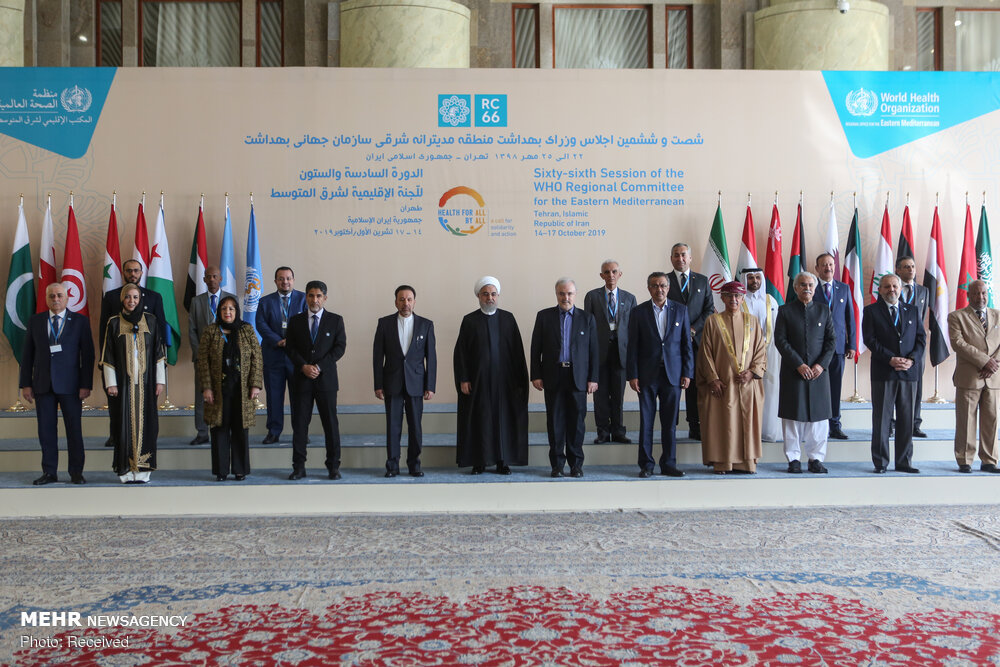WHO Regional Committee for Eastern Mediterranean kicks off

TEHRAN – The 66th session of the World Health Organization Regional Committee for the Eastern Mediterranean opened in Tehran on Tuesday.
Health ministers and high-level representatives of the 22 countries and territories of the WHO Eastern Mediterranean Region, partner organizations and civil society are taking part in the 3-day event.
During the opening ceremony, Iranian Health Minister Saeed Namaki said that cruel U.S. sanctions and denial of access to drugs, medical equipment and food are crimes against humanity, ISNA news agency reported on Tuesday.
Achievements towards universal health coverage
Iran is committed to fully implement the resolutions of the WHO and the United Nations on achieving the Sustainable Development Goals and universal coverage of health services, and has achieved remarkable success in this regard, Namaki highlighted.
He went on to note that prior to the Alma-Ata Declaration [in 1978], Iran had provided health care services to all its citizens, so that in the past four decades it had set up 17,000 of health centers which are under supervision of comprehensive health system.
In October 2018, heads of state and government, ministers and representatives of states and governments, participated in the Global Conference on Primary Health Care, in Kazakhstan, reaffirming the commitments expressed in the visionary Declaration of Alma-Ata of 1978 and the 2030 Agenda for Sustainable Development, in pursuit of Health for All.
Namaki highlighted that Iran could provide comprehensive health coverage of the rural population by 100 percent and the urban population by 90 percent.
Infant, maternal mortality declined
Iran succeeded in reducing maternal mortality from 200 to less than 20 per 100,000 live births by 2018, while infant mortality also decreased from 120 per 1,000 live births to less than 17.4 per 1,000 live births, he added.
Increasing child immunization rate to over 98 percent is the other important achievements, he emphasized.
Stating that the Iranian health care system has been repeatedly approved by the WHO, Namaki said that in 2014, Iran adopted a health transformation plan that aims to provide everyone with access to quality health services without imposing heavy financial burdens and supporting low-income groups of the society.
A step toward reducing the burden of NCDs
Undoubtedly one of the major challenges for the health system in the world is non-communicable diseases (NCDs) and the leading one of which is hypertension, he lamented, noting, in this regard, Iran launched a national blood pressure campaign last summer that covered 31 million people over the age of 30 while identified and treated 2 million new cases.
Flood response a commendable model
“During the recent floods that has engulfed our country, the Iranian health system has shown, without any foreign technical assistance, the ability to deal with natural disasters; constant monitoring prevented all epidemic intestinal illness usually caused by contaminated water or food.
Measures implemented in response to flood have provided a unique model that can be exploited as a successful model in crisis management for the WHO,” Namaki stated.
On the way to eradication
“We are implementing one of the most successful health care models to eradicate malaria,” he said, adding, as before that accomplished a comprehensive strategy to eliminate Measles including mass immunization campaign for people aged 5-25 years.
Iran, as head of the 9th WHO Framework Convention on Tobacco Control, calls on countries to reduce the prevalence of drug use and recommend intensification of activities in this field, urging countries to decrease tobacco consumption by 30 percent by 2050, along with fighting illicit trade, he also announced.
Iran, the health leader in Eastern Mediterranean region
WHO Director-General, Tedros Adhanom Ghebreyesus, for his part said that Iran is the health leader in the Eastern Mediterranean region as the country has managed to control the mortality of infants, women and communicable diseases by promoting health services.
Regarding Iran's health achievements, the World Health Organization is committed to help the country achieve better and higher quality health services, he stated.
WHO reports indicate that there are numerous health problems in the eastern Mediterranean region, but countries' efforts and actions have given rise to optimism, he emphasized, IRNA news agency reported.
“We need political commitment to help improve healthcare in the region’s countries, including Afghanistan, Jordan, Iran, Pakistan, and etc.”
"This is a global program to control, prevent and reduce hepatitis B deaths that we have to work on in the countries of this region, especially Afghanistan, although the mortality rate is somewhat lower," he said. It has declined but there are still cases of deaths due to the disease, he added.
Referring to the Global Hepatitis Program, he noted that this is a global program for controlling, preventing and reducing hepatitis that requires measures to be implemented in the countries, especially Afghanistan which is tackling with the disease prevalence.
“A framework must be put in place to control disease-related deaths so that mothers, infants, and patients can live healthier lives, to do so, we need more nurses, caregivers, and health workers to achieve the goal and reduce mortality rates,” he also said.
“We have developed a plan to achieve the goal and I pledge to help implement it this year, but we have other problems in the area, such as uncontrolled drug use and environmental issues, that we are ready to help address them,” he concluded.
FB/MG
Leave a Comment